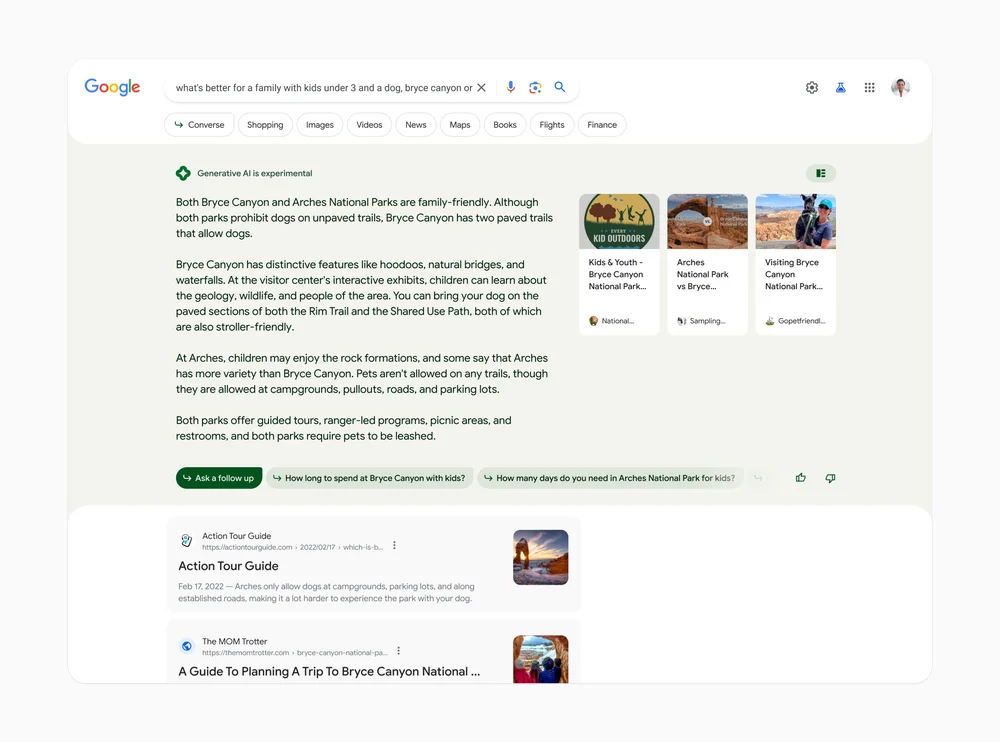Case Study: Supercharging Search with Generative AI
Elizabeth Reid
Vice President & GM, Search
For the past 25 years, we’ve been devoted to the science and the craft of building a search engine. We’ve developed completely new ways to search, powered by our latest advancements in AI — whether that’s searching visually with Lens, or across modalities, using both images and text with multisearch. In fact, people now use Lens for 12 billion visual searches a month — a four-fold increase in just two years, and a growing number of those searches are multimodal.
With new breakthroughs in generative AI, we’re again reimagining what a search engine can do. With this powerful new technology, we can unlock entirely new types of questions you never thought Search could answer, and transform the way information is organized, to help you sort through and make sense of what’s out there.
Today we’re sharing a look at our first steps in this new era of Search, and you’ll be able to first try these generative AI capabilities in Search Labs, a new way to access early experiments in Search.
Improving Search with generative AI
With new generative AI capabilities in Search, we’re now taking more of the work out of searching, so you’ll be able to understand a topic faster, uncover new viewpoints and insights, and get things done more easily.
Let’s take a question like “what’s better for a family with kids under 3 and a dog, bryce canyon or arches.” Normally, you might break this one question down into smaller ones, sort through the vast information available, and start to piece things together yourself. With generative AI, Search can do some of that heavy lifting for you.
You’ll see an AI-powered snapshot of key information to consider, with links to dig deeper.

Below this snapshot, you’ll see suggested next steps, including the ability to ask follow-up questions, like “How long to spend at Bryce Canyon with kids?” When you tap on these, it takes you to a new conversational mode, where you can ask Google more about the topic you’re exploring.
Context will be carried over from question to question, to help you more naturally continue your exploration. You’ll also find helpful jumping-off points to web content and a range of perspectives that you can dig into.
Helping you shop with generative AI
With generative AI in Search, we can help you understand the full picture when you’re shopping, making even the most considered and complex purchase decisions faster and much easier.
When searching for a product, you’ll get a snapshot of noteworthy factors to consider and products that fit the bill. You’ll also get product descriptions that include relevant, up-to-date reviews, ratings, prices and product images. That’s because this new generative AI shopping experience is built on Google’s Shopping Graph, which has more than 35 billion product listings — making it the world’s most comprehensive dataset of constantly-changing products, sellers, brands, reviews and inventory out there. In fact, every hour, more than 1.8 billion listings are refreshed in our Shopping Graph to give people fresh, reliable results.

Featuring a wide range of voices and sources
We know that people want to hear insights from others to help inform their decisions, so we’ve designed these new experiences to highlight and drive attention to content on the web, making it easy for people to dive deeper on the topic they’re learning about. As we bring generative AI into Search, we’re committed to continue sending valuable traffic to sites across the web.
We also believe that ads are a vital piece of how the web works, and help people find relevant products and services. In this new generative experience, Search ads will continue to appear in dedicated ad slots throughout the page. And we’ll continue to uphold our commitment to ads transparency and making sure ads are distinguishable from organic search results.
Taking a responsible approach
There are known limitations with generative AI and LLMs, and Search, even today, will not always get it right. We’re taking a responsible and deliberate approach to bringing new generative AI capabilities to Search. We’ve trained these models to uphold Search’s high bar for quality, and we will continue to make improvements over time. They rely on our hallmark systems that we’ve fine-tuned for decades, and we’ve also applied additional guardrails, like limiting the types of queries where these capabilities will appear.
To evaluate the information for yourself, you can also expand your view to see how the response is corroborated, and click to go deeper.
Starting with Search Labs
We’re starting with an experiment in Search Labs, called SGE (Search Generative Experience), available on Chrome desktop and the Google App (Android and iOS) in the U.S. (English-only at launch), so we can incorporate feedback and continue to improve the experience over time.
We’ll be opening up signups for Search Labs today, with access to SGE beginning in the coming weeks. Just tap the Labs icon in the Google app or Chrome desktop to express your interest, and visit labs.google.com/search to learn more.

Comments are closed